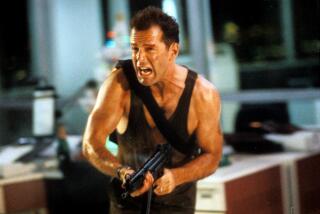MOVIE REVIEWS : ‘Free Willy’: A Fairy Tale of Innocence
For Herman Melville in “Moby Dick,” the white sperm whale was a vast, mysterious monarch of the seas, a Godlike being dispensing destiny to the puny humans trying to catch it. For the makers of “Free Willy” (citywide), the Orca or “killer” whale, a more predatory cetacean, becomes their symbol of nature exploited, ultimate victim of man’s greed and rapacity.
And though, like whale Willy himself, trapped in a park, the theme is imprisoned in a movie fairy tale--a slightly sentimental adventure story of Boy meets Whale--somehow its majesty comes through anyway. Children’s movies shouldn’t be asked for the sophistication and verisimilitude we demand of adult films. And “Free Willy” is for children and families, first and foremost.
For them, it should be one of the treats of the year. There’s a muscular sincerity to this movie, a power and spread to its imagery that triumphs over the occasional candied purple patches or strained plot twists. At its best, “Free Willy” gets some of the primal emotion of a “Lassie Come Home,” a “White Mane” or a “Yearling”: those “corny” or fanciful animal movies that stick in our minds for years. And whether you cheer or jeer at its wildly over-the-top cliff-hanger climax--with the good guys desperately speeding a kidnaped whale to the ocean in a garage repair truck, while bad guys fiendishly try to stop them--”Willy” still often captures honestly a sense of the wonders and terrors of nature.
Perhaps that’s because the producers have been so lavish: The prelude wildlife whale ballet was shot by the famous whale photographer Bob Talbot. Perhaps it’s due to our knowledge of the current danger to whales, a species slaughtered, according to Jacques-Yves Cousteau, at the staggering rate of 40,000 a year between 1929 and 1979. Perhaps it’s because “Free Willy,” as written by Keith A. Walker and Corey Blechman, keeps mostly within an “innocent eye.” It follows the perspective and experience of a 12-year-old protagonist, Jason James Richter as urban street kid Jesse, whose delinquency lands him in a part-time job at the local sea world.
Jesse is consciously portrayed as a kid with an edge, surly, rebellious and suspicious of his guardians, nice-guy car mechanic Glen (Michael Madsen, in his “Thelma & Louise” mode) and his artsy journalist wife, Annie (Jayne Atkinson). And suspicious too of his park employers, an American Indian myth-spinner (August Schellenberg, from “Black Robe”) and a collegiate feminist seal-handler (Lori Petty).
The mixture of races and types--Jesse’s youth-officer is African-American (Mykelti Williamson) and the villains are pinch-faced money-mad park entrepreneurs Dial and Wade (Michael Ironside and Richard Riehle)--stamps this movie as not just a fairy tale but a liberal one, a “Save the Whales” fantasy of seemingly impeccable political “correctness.”
It’s a tribute to the movie’s makers that they never let the pattern obtrude. Music brings boy and whale together--Jesse’s bluesy harmonica, Willy’s plaintive whale song--and there’s both magic in the encounter, and a weird believability in their blossoming friendship.
Partially, this comes from adroit casting. Richter, who has never acted in a movie before, may have the blond, Beatle-hair good looks of a sitcom child but he’s not cutesy or sticky. His surliness never seems put-on, and there’s a rapt absorption when he and Willy interact. Willy himself--impersonated by the marvelous Mexico City performing whale Keiko--is a genuinely lovable Orca. “Killer” whales, like dolphins, are brainy and sociable enough to be ace performers, and though Keiko is sometimes doubled by Walt Conti’s ingenious animatronics whale, it’s only in the dangerous or out-of-water scenes.
Simon Wincer, who directed “Willy,” has been stuck in a kind of action-movie rut since he emigrated to Hollywood from Australia. But his one great American movie, the 1989 “Lonesome Dove,” probably started the Western movie renaissance that led to “Dances With Wolves” and “Unforgiven.” And “Dove’s” considerable virtues--its unforced rhythm and wonderful feel for landscape and place, the casual density of its background detail, the understated low-key intensity of its performances--are present here, too.
In the end, how we respond to “Free Willy” (MPAA-rated PG) is a matter of taste and temperament. Anti-ecology jokesters of the P.J. O’Rourke stripe will find the movie ludicrous. But children and adults willing to succumb to its wonders, and even its absurdities, may have the last laugh. There’s something to be said, after all, for innocence, the interconnectedness of life, the ocean’s awesome sweep. There’s something to be said for fairy tales--when they’re done with breadth and emotion. At its best, “Free Willy” jumps that barrier.
‘Free Willy’
Jason James Richter:Jesse
Lori Petty: Rae
Michael Madsen: Glen
August Schellenberg: Randolph
A Warner Bros. presentation in association with Le Studio Canal+/Regency Enterprises/Alcor Films of a Donner/Shuler-Donner production. Director Simon Wincer. Producers Jennie Lew Tugend, Lauren Shuler-Donner. Executive producers Richard Donner, Arnon Milchan. Screenplay by Keith A. Walker, Corey Blechman. Cinematographer Robbie Greenberg. Editor O. Nicholas Brown. Costumes April Ferry. Music Basil Poledouris. Title Song Michael Jackson. Production design Charles Rosen. Whale Effects Supervisor Walt Conti. Wildlife Cinematography Bob Talbot. With Keiko as Willy. Running time: 1 hour, 52 minutes.
MPAA-rated PG.
More to Read
Only good movies
Get the Indie Focus newsletter, Mark Olsen's weekly guide to the world of cinema.
You may occasionally receive promotional content from the Los Angeles Times.










